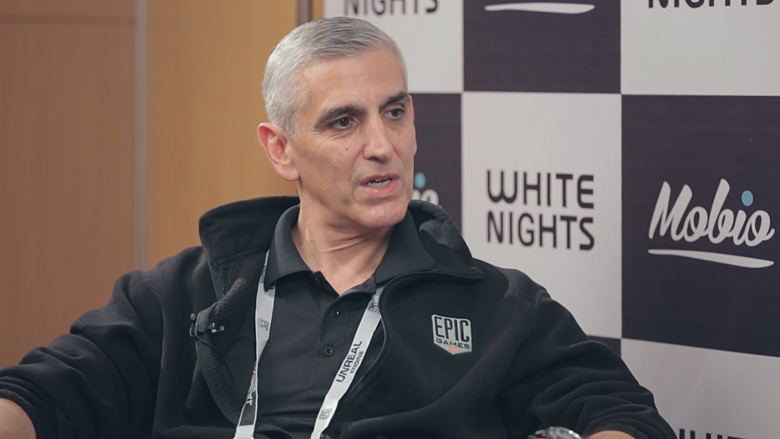Mobio Talks within the framework of White Nights Moscow 2016, which took place on October 11-12, interviewed the speakers of the conference. Today we publish a conversation between Alexey Pisarevsky, CEO of Mobio, and Luis Cataldi, evangelist of Epic Games.

Tell us about your role in Epic Games, what does the evangelist do?
I have a great job. I travel the world and teach people how to work with the Unreal Engine game engine. At one time, Epic needed someone who could communicate with universities, and had a very diverse experience in development and education, and they called me.
What distinguishes Unreal Engine from other engines?
Epic has been actively working on the engine for more than 20 years. It all started with the first Unreal Engine, which we developed 16-17 years ago. When we made it a serious tool for game development, third-party teams started coming to us and asking for an engine to develop their projects. And we started licensing it for professional teams. The engine was perfect for console projects.
Unreal Engine 4 was released in 2014. Licensing became easier because Epic opened the source code of the engine for the community. Unreal Engine is a unique professional tool, open to the general public, which allows you to reduce the development team to two people. The engine is designed for both large studios and small teams of indie developers, such as, for example, Psyonix, who developed Rocket League.
Which games are easier to create on Unreal Engine?
Now the engine can be used not only for first-person shooters. People develop different kinds of games, so the engine can be used in a variety of areas. For example, Unreal Engine can be used by programmers engaged in architectural visualization, developing virtual training courses for doctors, as well as people engaged in filming and creating entire films.
Is it difficult to learn how to develop games on Unreal Engine?
There are many websites and educational resources on the web that are constantly updated with content. We make training materials ourselves and release them on Twitch once a week, every Tuesday. They are also on our YouTube channel. The lessons are intended for all levels of users — from absolute beginners, to people with experience and advanced users. Starting the learning process is, in fact, simple.
Do developers use the engine for free?
You can download the engine, develop a game on it, and take training for free. There is a royalty system: if you developed a game on Unreal Engine, released and received more than $3,000 dollars per quarter for the game, you pay 5% royalties to Epic. If these conditions do not suit you, there is always an opportunity to discuss other options for cooperation.
You gave a talk about VR today, do you think virtual reality is already mainstream or just an emerging trend?
The development of VR is largely a matter of time. Devices are still at an early stage of development, and software is developing rapidly. For example, people like entertainment — VR is perfect for this. From a learning point of view, there are also incredible opportunities. Imagine that you can study the ocean floor not by textbooks and maps, but by walking along the ocean floor with a virtual instructor, or learn about Einstein from Einstein himself, from his hologram. There are many options. Now the use of many technologies is limited to equipment or devices. There are mobile VR, but they don’t have powerful processors that will allow you to immerse yourself in reality, as you can do with a PC.
What is the future for: virtual, mixed or augmented reality?
The Holy Grail will be mixed reality. When we sit here and we can play virtual chess or talk about a motorcycle and immediately look at it, spin its model in our hands, and then see how it will ride in snow conditions. If you think about the money that people spend when deciding to buy a product that they haven’t fully studied, and how often the decisions they make turn out to be wrong after the money is spent, then virtual or augmented reality are great helpers in making the best decision. These technologies can change the world.
How long will it take to wait for these things to come into use?
We didn’t go from one megapixel in cameras to a 16-megapixel camera overnight. We had to use a 4-megapixel camera first, then an 8-megapixel camera, a 10-megapixel camera, and eventually we got a 16-megapixel camera. Despite the fact that the technology that allows you to create a 16-megapixel camera existed from the very beginning.
What advice can you give to developers? Where to go, what to read?
I would recommend watching the video on our YouTube channel. We post a lot of training videos, including on VR. There are also other educational resources on YouTube. One of my favorites is the Mitch McCaffrey channel, which is called Mitch’s VR Lab. He is currently finishing work on a book about VR, which will be released by Pierce Press in February.
